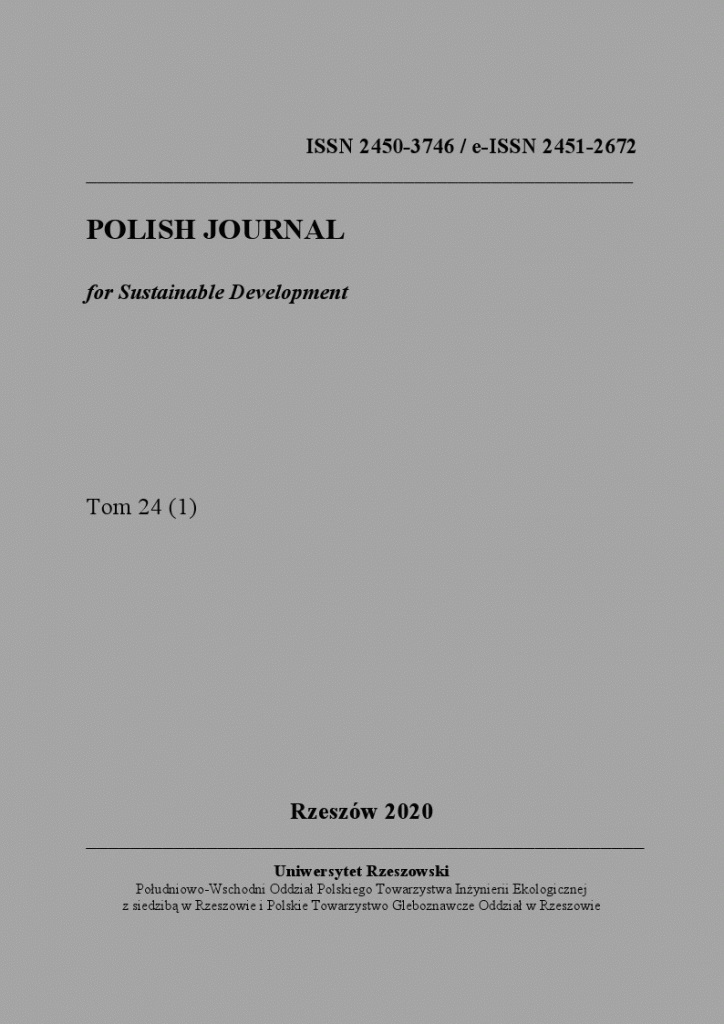Alternative and exotic sources of animal protein in human nutrition in the context of rational use of environment resources
DOI:
https://doi.org/10.15584/pjsd.2020.24.1.10Keywords:
sustainable development, exotic animal species, meat, insect protein, meat in vitroAbstract
Intensification of livestock farming, consumerism prevailing in wealthy countries as well as excessive consumption and waste of food significantly contribute to the progressive degradation of the natural environment. Population growth is associated with increasing demand for nutrients, including animal protein. Practical implementation of the rules of sustainable development is linked with a necessity to seek innovative solutions, to ensure human well-being by meeting such essential needs as access to food. More and more commonly appearing in the markets within the European Union countries, in addition to the traditional meats, exotic types of meat may effectively supplement the human diet. Alternatives to the meat from food animals in the near future may include insect proteins and meat produced in vitro. Large scale production of insect protein and cultured meat is more environment friendly than livestock farming.
Downloads
References
Adamczak L., Florowski T., Chmiel M., Pietrzak D. 2013. Wydajność rzeźna strusi i uzysk wybranych elementów kulinarnych. Zeszyty Problemowe Postępów Nauk Rolniczych. 575. 3-11.
Balowski M., Sobczak M., Żochowska-Kujawska J., Pytel-Zając O., Niedźwiedź M. 2015. Comparison of meat quality of selected exotic animals species. Folia Pomeranae Universitatis Technologiae Stetinensis. 322. 5-14.
Bartkowicz J. 2018. Owady jadalne w aspekcie żywieniowym, ekonomicznym i środowiskowym. Handel Wewnętrzny. 2. 77-89.
Boczek J., Pruszyński S. 2013. Owady w żywieniu człowieka i zwierząt gospodarskich. Zagadnienia Doradztwa Rolniczego. 3. 98-107.
BonaVita.pl. 2019. Mięso z próbówki, czyli produkcja, wady i zalety mięsa wyhodowanego w laboratorium. [dok. elektr.: http://bonavita.pl/mieso-z-probowki-czyli-produkcja-wady-i-zalety-miesa-wyhodowanego-w-laboratorium . data wejścia: 15. 05. 2020].
Bueschke M., Kulczyński B., Gramza-Michałowska A., Kubiak T. 2017. Alternatywne źródła białka w żywieniu człowieka. Zeszyty Naukowe Szkoły Głównej Gospodarstwa Wiejskiego w Warszawie. Problemy Rolnictwa Światowego. 17 (3). 49-59.
Dziurka D., Długosz B. 2016. Sposoby użytkowania osłów. Wiadomości Zootechniczne. R. LIV (3). 77-87.
Hoffman L.C., Fisher P.P., Sales J. 2000. Carcass and meat characteristics of the Nile crocodile (Crocodylus niloticus). Journal of Agricultural Science. 80. 390-396.
Hołdys A. 2018. Kto zje mięso z probówki? Dokument elektroniczny: http://wyborcz.pl/7,75400,23029020,kto-zje-mieso-z-probowki.html?disableRedirects=true[data wejścia: 15. 02. 2020].
Kostecka J. 2010. Retardacja przekształcania zasobów przyrodniczych jako element zrównoważonego rozwoju. Biuletyn Komitetu Przestrzennego Zagospodarowania Kraju PAN. 242. 27-49.
Kostecka J. 2013. Retardacja tempa życia i przekształcania zasobów przyrody – wybrane implikacje obywatelskie. Inżynieria Ekologiczna. 34. 38-52.
Kostecka J., Konieczna K., Cunha L.M. 2017. Evaluation of insect-based food acceptance by representatives of Polish consumers in the context of natural resources processing retardation. Journal of Ecological Engineering, 18 (2). 166-174. DOI: 10.12911/22998993/68301
Krzywiński T., Tokarczyk G. 2011. Owady - źródło ekologicznego białka. Przemysł Spożywczy. 12. 34-38.
Kuchlewska M. 2017. Mięso zwierząt egzotycznych na polskim stole. Ogólnopolski Informator Masarski. 9. 12-24.
Kuźnicka E., Grondkowska A. 2014. Baktrian (Camelus bactrianus) i dromader (Camelus dromedarius) - różne formy użytkowania. Wiadomości Zootechniczne. R. LII (1). 82-91.
Makała H., 2003. Mięso strusia - nowy surowiec w przetwórstwie mięsa. Gospodarka Mięsna. 9. 28-31.
Markowska-Daniel I., Kita1 J., Kalicki M. 2018. Wielbłądowate jako potencjalne źródło chorób odzwierzęcych. Życie Weterynaryjne. 7. 470-475.
Mroczek J.R., Rudy M., Mroczek K. 2019. Owady alternatywnym źródłem białka dla ludzi i zwierząt gospodarskich. Aura. 7. 6-9.
Nowak D. 2008. Mięso zwierząt egzotycznych nietypowe źródło białka. Przemysł Spożywczy. 3. 17-20.
Polidori P., Pucciarelli S., Ariani A., Polzonetti V., Vincenzetti S. 2015. A comparison of the carcass and meat quality of Martina Franca donkey foals aged 8 or 12 months. Meat Science. 106. 6-10.
Pomianowski J.F. Chwastowska-Siwiecka I., Skiepko N., Debczynska A. 2016. Pozyskiwanie i jakość mięsa wielbłąda. Gospodarka Mięsna. 8. 64-68.
Poskrobko B., Kostecka J. 2016. Retardacja w świadomości społecznej. Polish Journal for Sustainable Development. 20. 145-160.
Rokicki T. 2006. Właściwości mięsa strusiego. Gospodarka Mięsna. 8. 38-39.
Stanisławczyk R., Duma-Kocan P., Marchel M. 2016. Egzotyczne źródła białka zwierzęcego. [w:] Żywienie a zdrowie. Red. M. Zin i M. Rudy. Wyd. Stowarzyszenie Naukowo-Techniczne Inżynierów i Techników Przemysłu Spożywczego - Rzeszów: 61-72.
Zidan M., Kassem A., Dougbag A., El Ghazzawi E., Abd El Aziz M., Pabst R. 2000. The spleen of the one humped camel (Camelus dromedarius) has a unique histological structure. Journal of Anatomy. 196. 425-432.
Zielińska E., Karaś M., Jakubczyk A. 2015. Owady w diecie człowieka – nie konwencjonalne źródło pełnowartościowego białka. [w]: Trendy w żywieniu człowieka. Red. M. Karwowska, W. Gustaw. Wydawnictwo Naukowe Polskiego Towarzystwa Technologów Żywności - Kraków. 367-374.
Downloads
Published
Issue
Section
License
Copyright (c) 2020 Polish Journal for Sustainable Development

This work is licensed under a Creative Commons Attribution-NonCommercial-NoDerivatives 4.0 International License.


